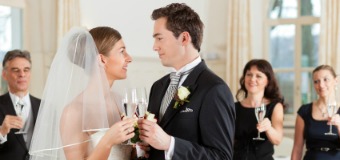The number of marriages in Ireland rose last year, with traditional church ceremonies still the most popular choice for intending couples.
According to the Annual Report of the Registrar General for 2014, some 22,033 marriages were recorded for the year, a 6.6% increase over the figure of 20,670 in 2013.
However, the latest figures were compiled both against civil ceremonies and in the first full year in which secular marriage ceremonies were recognised in law. The report therefore sets the 14,972 traditional church weddings against 6,167 civil ceremonies, divided between registrars’ offices and a variety of other venues, such as hotels and stately homes. Some 32% of the civil marriage figure took place at such a venue. Just 4% of marriages for the year were secular.
Noting a “marked increase in the number of civil marriages over a lengthy period”, the report reveals that this growth means that the religious marriage rate has declined slightly from 71% of the total for the year 2009 to 68% in 2014. The report finds a steady increase in civil marriages since 1996 when just 6% of marriages fell into that category, and, when broken down, of the 2014 increase in recorded marriages of 1,363, 71% were civil or secular while just 29% were religious.
In the category of civil partnerships, the year saw 392 unions, divided between 242 same-sex male and 150 same-sex female.
The Registrar General also flagged the issue of marriages of convenience, for which there is anecdotal evidence among the year’s figures. For non-Irish EU nationals marrying non-EU nationals, the figures showed a rise to just over 2,200. Here, the Registrar points out, “the relatively low rate of conversion of notices of intention to marry to actual marriage would suggest that marriages of convenience are a significant problem”.
















